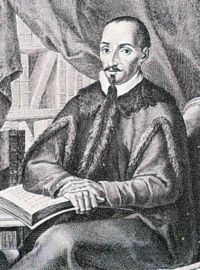
Jeronimo Zurita y Castro
Encyclopedia

Spain
Spain , officially the Kingdom of Spain languages]] under the European Charter for Regional or Minority Languages. In each of these, Spain's official name is as follows:;;;;;;), is a country and member state of the European Union located in southwestern Europe on the Iberian Peninsula...
historian of the sixteenth century who founded the modern tradition of historical scholarship in Spain.
Born at Zaragoza
Zaragoza
Zaragoza , also called Saragossa in English, is the capital city of the Zaragoza Province and of the autonomous community of Aragon, Spain...
, he studied at Alcalá de Henares
Alcalá de Henares
Alcalá de Henares , meaning Citadel on the river Henares, is a Spanish city, whose historical centre is one of UNESCO's World Heritage Sites, and one of the first bishoprics founded in Spain...
under the Hellenist
Hellenism (Academia)
Academics who study ancient or modern Greece may be referred to as Hellenists, and thus the study of Greece may be referred to as Hellenism. This should not be confused with the use of Hellenism to mean the spread of Greek culture, nor to describe the neoclassic Hellenism movement....
Hernan Nufiez. Through the influence of his father, Miguel de Zurita, physician to Charles V, Holy Roman Emperor
Charles V, Holy Roman Emperor
Charles V was ruler of the Holy Roman Empire from 1519 and, as Charles I, of the Spanish Empire from 1516 until his voluntary retirement and abdication in favor of his younger brother Ferdinand I and his son Philip II in 1556.As...
, he entered the public service as magistrate at Barbastro
Barbastro
Barbastro is a city in the Somontano county, province of Huesca, Spain...
, and in 1537 was appointed assistant-secretary of the Inquisition
Inquisition
The Inquisition, Inquisitio Haereticae Pravitatis , was the "fight against heretics" by several institutions within the justice-system of the Roman Catholic Church. It started in the 12th century, with the introduction of torture in the persecution of heresy...
. In 1548 Zurita was nominated official chronicler of the kingdom of Aragon
Aragon
Aragon is a modern autonomous community in Spain, coextensive with the medieval Kingdom of Aragon. Located in northeastern Spain, the Aragonese autonomous community comprises three provinces : Huesca, Zaragoza, and Teruel. Its capital is Zaragoza...
, and in 1566 Philip II of Spain
Philip II of Spain
Philip II was King of Spain, Portugal, Naples, Sicily, and, while married to Mary I, King of England and Ireland. He was lord of the Seventeen Provinces from 1556 until 1581, holding various titles for the individual territories such as duke or count....
attached him as secretary to the council of the Inquisition, delegating to him the conduct of all matters sufficiently important to require the king's signature. Zurita resigned these posts on the January 21, 1571, obtained a sinecure at Zaragoza, and dedicated himself wholly to the composition of his Anales de la Corona de Aragón, the first part of which had appeared in 1562; he lived to see the last volume printed at Zaragoza on the April 22, 1580, and died on the November 3 following.
Zurita's style is somewhat crabbed and dry, but his authority is unquestionable; he displayed a new conception of an historian's duties, and, not content with the ample materials stored in the archives of Aragon, continued his researches in the libraries of Rome
Rome
Rome is the capital of Italy and the country's largest and most populated city and comune, with over 2.7 million residents in . The city is located in the central-western portion of the Italian Peninsula, on the Tiber River within the Lazio region of Italy.Rome's history spans two and a half...
, Naples
Naples
Naples is a city in Southern Italy, situated on the country's west coast by the Gulf of Naples. Lying between two notable volcanic regions, Mount Vesuvius and the Phlegraean Fields, it is the capital of the region of Campania and of the province of Naples...
and Sicily
Sicily
Sicily is a region of Italy, and is the largest island in the Mediterranean Sea. Along with the surrounding minor islands, it constitutes an autonomous region of Italy, the Regione Autonoma Siciliana Sicily has a rich and unique culture, especially with regard to the arts, music, literature,...
.

